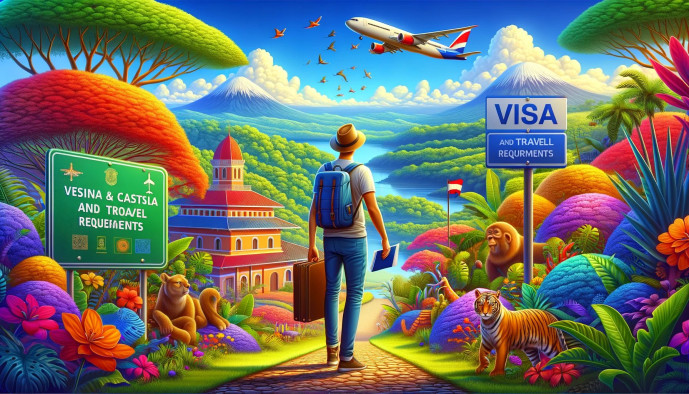Visa and travel Requirements to visit Costa Rica
Explore Costa Rica's entry protocols, visa policies, and health regulations for travelers.

Visa Requirements
Overview of Visa Policy
Costa Rica rolls out the red carpet for most travelers, but before you jet off to this paradise, it’s crucial to check if you need a visa. The policy hinges on your nationality, the purpose of your visit, and how long you plan to stay.
Countries with Visa Exemption
Visa-free travel is on the menu for citizens from countries such as the US, Canada, and most European nations, who can enjoy a no-fuss entry for up to 90 days. Check the latest list from Costa Rica’s immigration authority as this can change faster than a toucan snatches fruit!
Types of Visas for Costa Rica
Diving into the visa pool, you have tourist visas, student visas, and temporary residence visas. Your choice depends on whether you’re planning to sip cocktails on the beach, cram for exams, or put down some roots among the quetzals.
Required Documents for Visa
Papers, please! Get your passport, photos, flight itinerary, and proof of funds ready. And remember, your passport needs to remain valid for at least six months after your travel dates – immigration officers don’t have much of a sense of humor about that.
Visa Application Process
Start your visa quest at the nearest Costa Rican consulate. Fill out the forms, submit your documents, and maybe practice some Spanish while you wait. Patience is a virtue they appreciate – and so will you.
Visa Fees
The cost of a visa is as varied as the wildlife in Costa Rica. Expect to part with anywhere from $20 to $100, a small price to pay for the Pura Vida lifestyle.
Entry Requirements
Valid Passport
A no-brainer, but worth repeating: your passport must be valid for at least six months post-visit. Better to spend money on souvenirs than a rushed passport renewal.
Return Ticket
Prove you’re not planning to become a permanent beach fixture with a ticket out of the country. Airlines are sticklers for this rule, and they’re not in the business of providing free accommodation.
Proof of Financial Means
You’ll need to show you can afford your gallo pinto and casados – roughly $100 per month of stay should keep the immigration officers smiling.
Yellow Fever Vaccination Certificate
Hailing from a country with yellow fever? Bring a vaccination certificate. It’s not just a fashion statement; it’s your ticket to entry.
COVID-19 Regulations
Current COVID-19 Travel Advisory
As unpredictable as a rainforest downpour, COVID-19 regulations can change. Before you pack your bags, verify the latest travel advisory for Costa Rica.
Testing and Quarantine Rules
You might need to show a negative test or even do the quarantine shuffle. Stay updated, unless you fancy an extended stay at a ‘quarantine hotel’.
Customs Regulations
Allowed and Prohibited Items
Costa Rica welcomes your bikinis and board shorts but says ‘no gracias’ to drugs and unlicensed firearms. Keep it legal, or your vacation could turn into a staycation at the gray-bar hotel.
Duty-Free Allowance
Bring in 400 cigarettes, 3 liters of alcohol, and gifts up to $500 without incurring the wrath of customs. Anything more and you’re playing financial Russian roulette.
Staying in Costa Rica
Length of Stay
Enjoy up to 90 blissful days visa-free, but who’s counting? Oh right, the government.
Visa Extension Procedure
Love the Pura Vida too much? Apply for an extension at the immigration office, but do it before your current stay expires – unless you enjoy sweating more than necessary.
Safety and Health Advice
Vaccines and Health Precautions
Routine vaccines are your invisible armor; add on typhoid and hepatitis A to be safer than a sloth in a tree.
Safety Tips for Travelers
Stick to well-lit paths, use licensed taxis, and keep an eye on your belongings. Don’t make it easy for the pickpockets – they don’t need any more encouragement.
Practical Tips for Visiting Costa Rica
Currency and Payment Methods
The Colón is king, but greenbacks get the royal treatment too. Cards are widely accepted, though ATMs might treat you to extra fees as unwelcome as a mosquito at a blood bank.
Transportation Tips
Rent a car for freedom, hop on a bus for savings, or take a domestic flight to maximize beach time. Just remember, potholes are more common than iguanas here.
Language and Communication
Spanish is the lingua franca, but English is understood in tourist areas. Brush up on key phrases unless you want to mime your way through conversations.